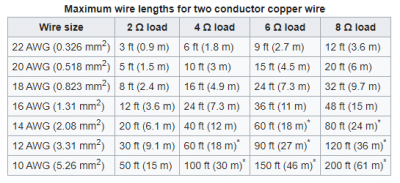What is AWG? 16AWG or 14AWG?
When deciding what kind of cable to use for your speaker setup, one of the first things to consider is the cable’s AWG (American Wire Gauge). The AWG refers to the thickness of the copper wire in the cable. The lower the gauge number, the thicker the wire. Most speaker wire ranges from 12 AWG to 16 AWG. It’s important to use the correct gauge for your speaker setup.
Pure Copper
Gauge isn’t the only thing to consider when you buy speaker cable. You also want to know what the cable is made of. Copper is the standard by which other electrical materials are rated. Other metals such as aluminum, zinc, and nickel are less conductive, but they are also usually cheaper. To cut down on cost, some cables are made with alloys mixed into the copper. While the percentage is relatively low, it still makes the wire significantly less conductive. Less conductive wire means poor sound quality. Adding in different alloys can also lead to cable breaks when going around tight corners. Pure copper cable might be a little bit more expensive, but it is definitely worth it in the long run.
Oxygen-Free
When dealing with copper, oxygen is bad news. Poor quality wire sometimes has microscopic pockets of oxygen trapped in the copper. Over time, these pockets can become larger and cause oxidation, which can make the copper less conductive, and may even destroy the cable. If you need your cable to last a while, make sure you look for oxygen-free cable.
What Cable to choose?

If you’re going to run speaker wire inside your walls or ceiling, you’ll need UL-rated speaker wire labeled CL2 or CL3.
If you want to install your outdoor speaker wire underground, you’ll need wire rated for direct burial.
In-wall wire is available with two conductors or four.
With a 4-conductor cable, you pull a single cable over the long distance from your amplifier or receiver to an in-wall volume control in another room. You can then run 2-conductor cables from the volume control to each of the stereo speakers in that location. Four-conductor wire is also good for connecting stereo-input speakers.
Monoprice 113719 Nimbus Series 14 Gauge AWG 4 Conductor CMP-Rated Speaker Wire/Cable – 100ft UL Plenum Rated, 100% Pure Bare Copper with Color Coded Conductors
How much wire do you need?
To figure out how much speaker wire you need, run a pull string from your receiver or amplifier location to each of the speaker locations. Measure the string, and then add a few extra feet (to provide some slack for easier connection to your gear).
So, Does The Gauge Size Really Matter?
Yes, the gauge size does matter in several cases:
- You’re an audiophile and want to match your speakers and wires perfectly, for the ultimate in audio delivery. In that case, you might want to dig even deeper than this discussion; there are plenty of formulas involving the impedance of your audio source and speakers, and the distance between them, which can tell you exactly what gauge to select.
- You’re running long or very long speaker cables, probably through wires and/or walls. In that case you’ll want 12AWG or 14AWG wires, depending on the length of the run.
- You have low-impedance speakers, in which case you’ll also want thicker speaker wires.
But for normal 8-ohm speakers, placed at normal distances from the audio source, for a normal listener – no, it really doesn’t matter what gauge size you use. The best bet for almost all standard speaker installations is 16AWG, and most people won’t notice a difference if they use 18AWG instead
Flat Speaker Wire/Cable – 50ft CL2 in Wall Rated
Looking for Speaker wire for inside the wall.

